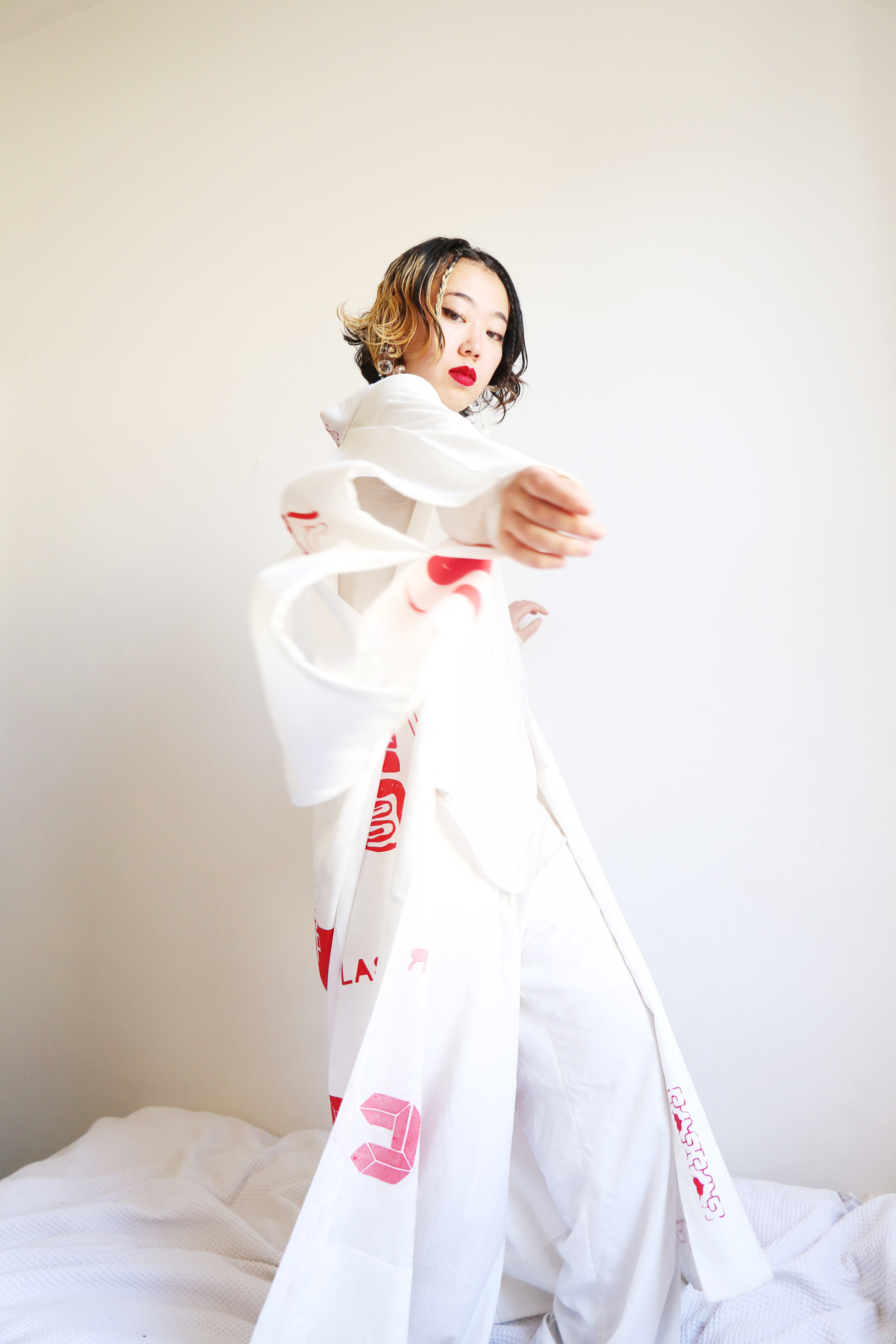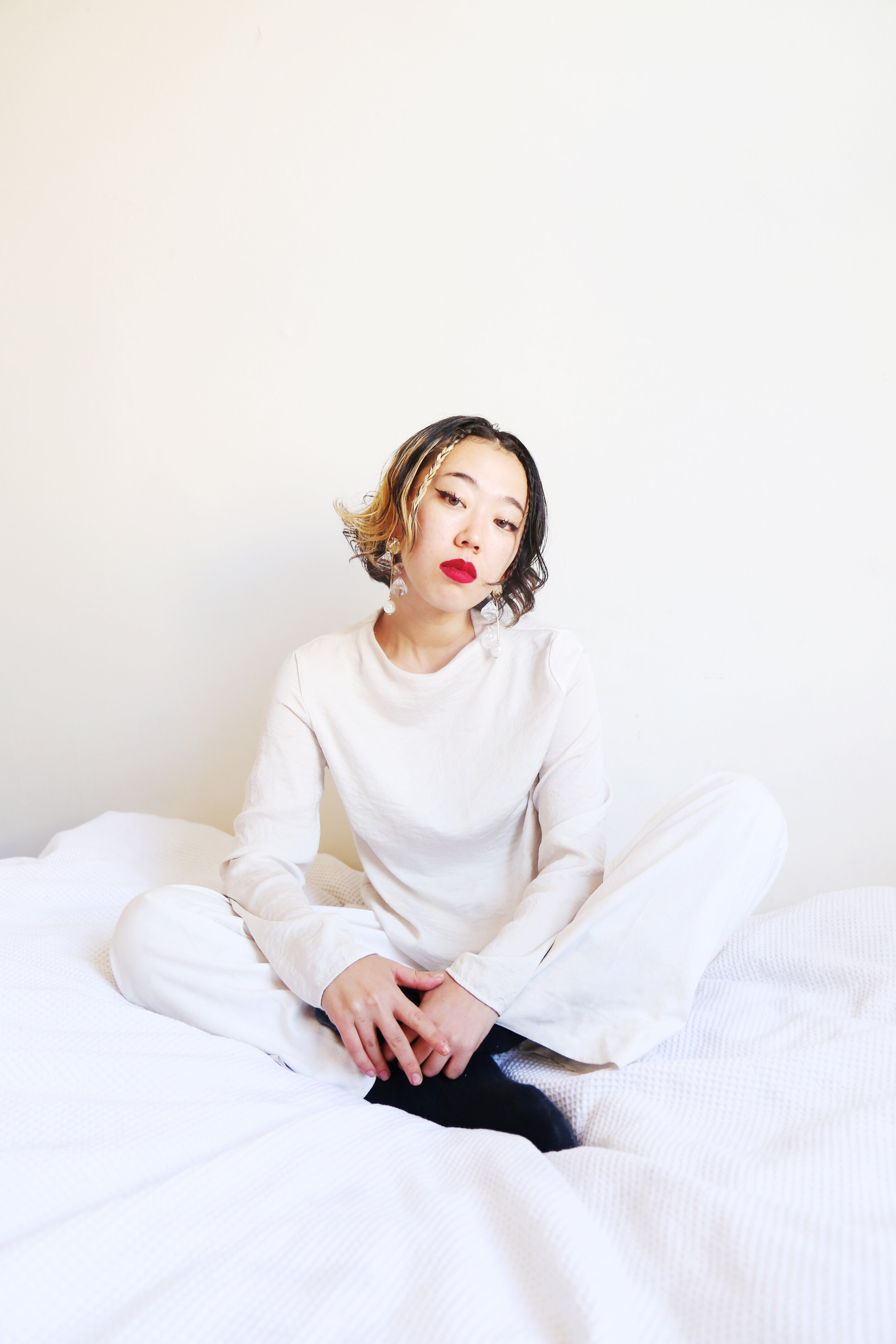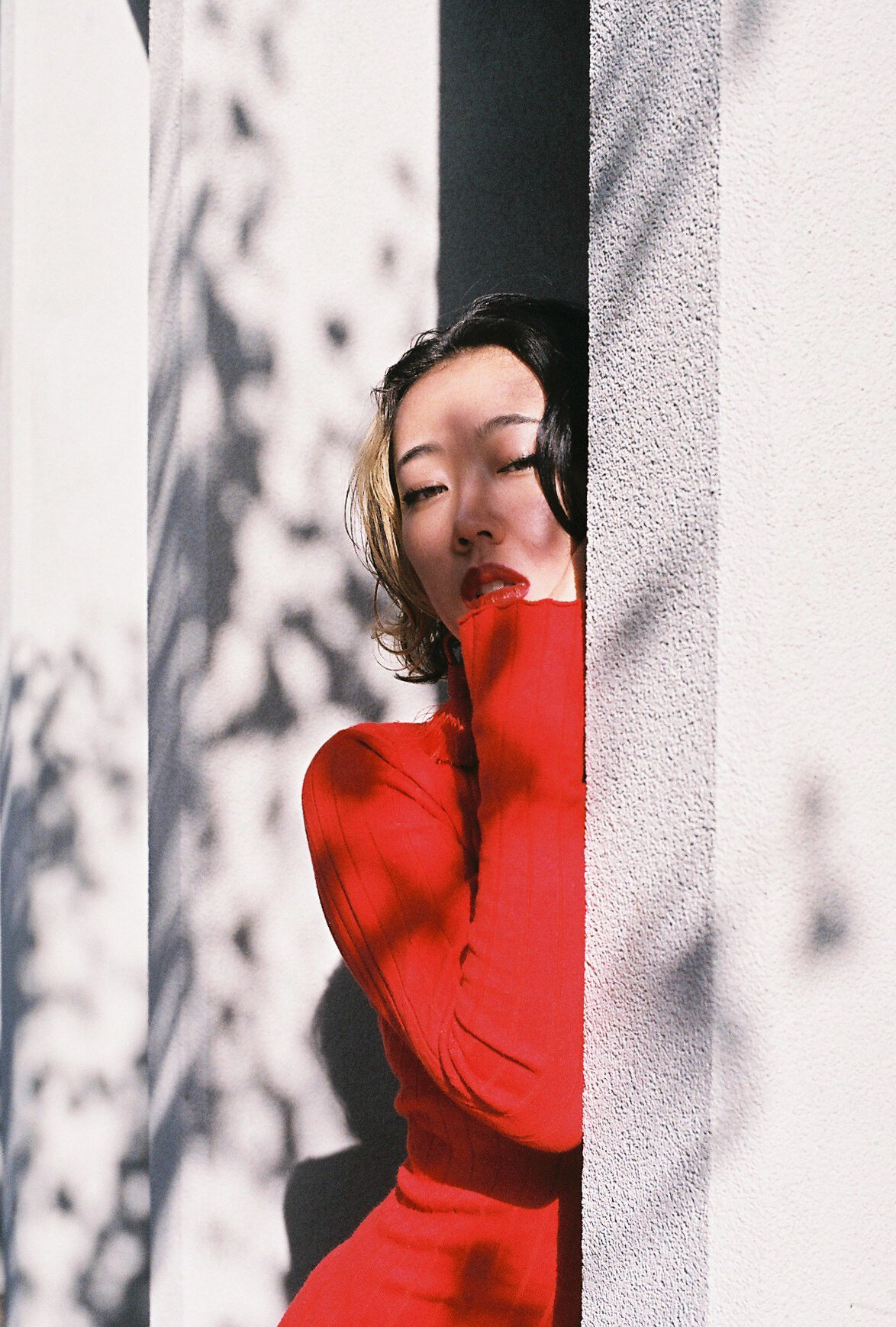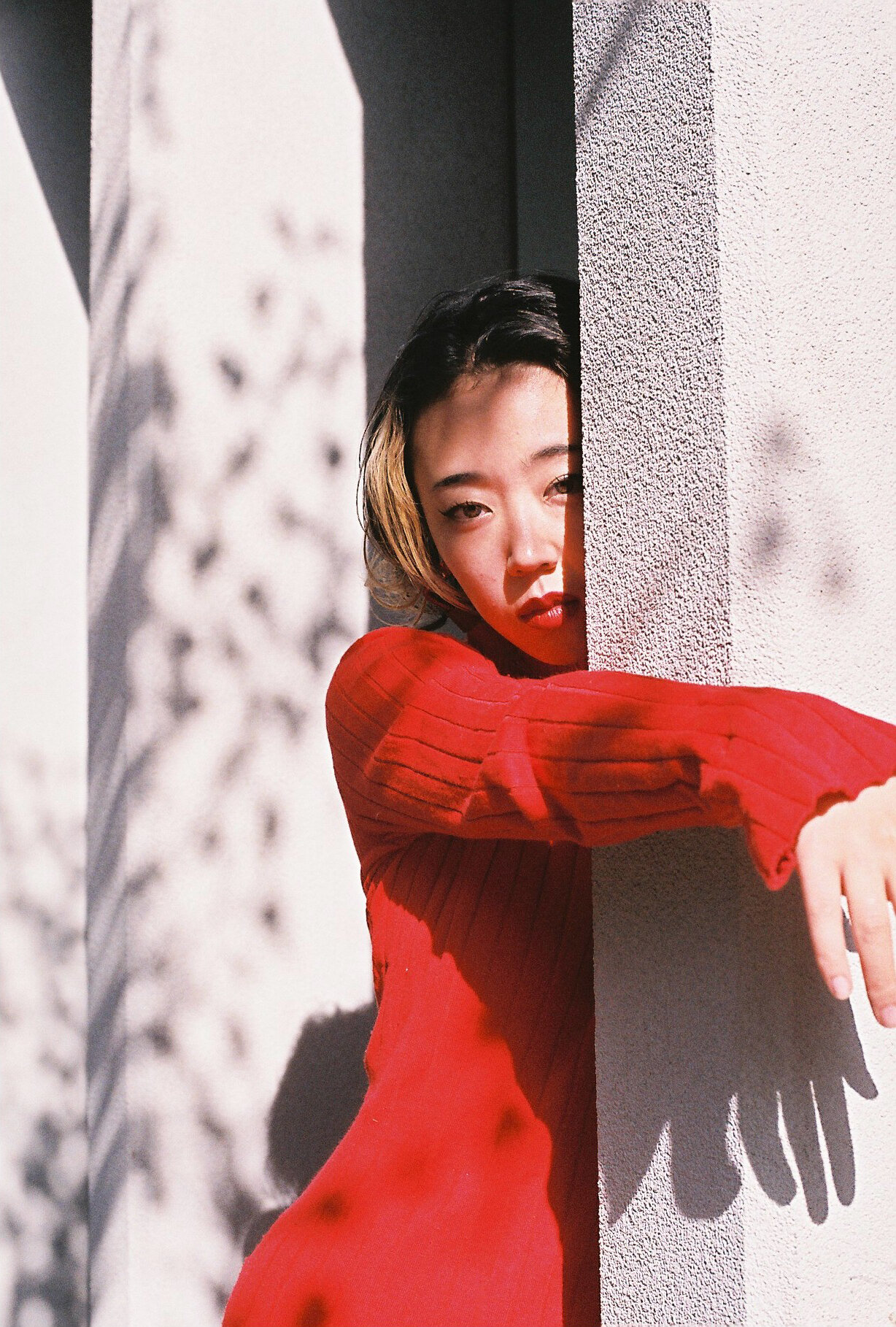Interview #136 — Elle Shimada
by Ro McCoy
Elle Shimada is a Melbourne-based violinist, producer, curator, DJ and multi-instrumentalist from Tokyo. Her collective fluidly fuses house, jungle, and other electronic genres with intricate cinematic music and jazz.
They endeavor to feature artists from diverse backgrounds and mediums to create multi-sensory experiences. Her curation is a politically charged peaceful protest, with emphasis on exchanging knowledge and energy between stage, dance floor and community. Shimada utilizes the uniting power of music to cultivate a dance-floor-activism that is inclusive, honest and raw.
Elle speaks to Ro McCoy about running away to New York, her methods of making home on the go, what it means to know her roots, and how these experiences inform her music.
Elle Shimada: I’m not a wordsmith, by the way.
Ro McCoy: Neither am I! There’s no pressure because this’ll be conversational. I read some of your interviews while I was waiting.
ES: No one would’ve read my things except for you.
RM: And I read that you moved here really young.
ES: When I was fifteen.
RM: To Byron, right?
ES: So I grew up in Tokyo, in commission housing, a pretty dodgy space. I was always really ready to leave I think, I didn’t quite know how to appreciate my upbringing until I got here. You know, Japanese culture is beautiful, but there’s just a lot of people in Tokyo and a lot of structures that I didn’t gel with very well, societal pressures.
RM: Retrospectively, do you know what you were looking for leaving Japan so young?
ES: Not at all! When I was fourteen I made some money, said thank you to my parents, and told them I’m going to New York. They were like, yeah right… good luck. Now that I think of it, it’s crazy they didn’t stop me! Like… I was fourteen, but they said, okay cool, go.
RM: How long were you there for?
ES: Like, two months. And I ran out of money, of course. I was living in a squat in Brooklyn. I was a wild kid… I was fearless, entirely fearless! I remember thinking to myself, why are people worried?
RM: It’s really funny because I did the same thing at sixteen… but I mean, that’s a big gap, between fourteen and sixteen. I was completely afraid. I wasn’t like fuck it, I was terrified.
ES: Sixteen is still a gnarly age! I guess I didn’t know any better, it wasn’t like a confidence built on experiences or achievements at all, it was naive.
RM: What’s your star sign?
ES: Taurus.
RM: Mm... makes sense.
ES: Also, my parents were both creatives and I had the key to my own house since I was very, very young. I always was quite independent. I was comfortable in my own company, thanks to Japan, being quite safe made me naive.
RM: Did you know anyone in New York before you left?
ES: Couple of people, but not really. I just kind of fell in there. A friend of mine, who I went to school with lived there, and I met their friends and their friends’ friends. I didn’t even speak English much, but I still went, okay I live here now, cool. I’m in New York, what’s up baby! I owe it to my parents or my star sign or something, but I just tend to do things without… It would be a mistake to say I don’t think about it, because I do think about it a lot, and I generally feel like I always prepare not to fail, and become quite confident. At that point I’m like, there’s no way it could go wrong, let’s do it.
RM: I feel like I plan for the worst and expect it to happen too, and when it doesn’t I’m pleasantly surprised.
ES: But I think also, it’s nice to fail. It’s nice to be in a position where with all these failures I’m still here. By the end of it all I had just enough money to buy a budget flight home. And my parents were like, you’re back Ellie, what’s up? And I was like, I’m leaving again, and my father and I found cheap flights to Australia and New Zealand, and I think they gave up on me around that time. They wanted me to study, but I was like, fuck that… why? I’ve finished my compulsory education—it’s optional after Year 9 in Japan.
Me and my dad travelled through New Zealand and Australia and I landed in Byron Bay, and I was like, this is cute… beach… I could do this. It’s not New York but… and ever since, I’ve been here. After that, I didn’t go back to Japan for four years. I didn’t want to until I had something to show for myself. I’m a proud bitch, I wanted to have a university degree at least. In Byron I studied at a Steiner school, and that’s when I faced my first big challenges in life, because I was blessed with being naturally okay at things till then, just enough to get by.
With the language barrier, the culture shock, being on my own at a young age, I had to admit I was struggling. I’d brought my violin with me, and I didn’t really play violin before, but I brought one to Australia because my grandmother gave it to me, and she’d passed away. So, I got really into music, and it helped me learn the language, get to know people, get to know myself, and my teenage life ended up being just a lot of music.
RM: Did you learn violin by just playing with it?
ES: Literally just fiddling around. VCA is my first formal education in music. I had a few teachers in high school. I played when I was eight for a little but didn’t last long.
RM: How did you find Australia upon arrival?
ES: Well, I landed in a very white environment, which came with some difficulties. There was a lot of racism, but I don’t think that was as much of a personal struggle. It did make me want to learn how we can get rid of this bullshit. Maybe it’s ignorant for me to say I didn’t struggle, but it just drew me to try learn deeper.
I was a wild kid… I was fearless, entirely fearless!
RM: It’s not ignorant, it probably wouldn’t have even been a priority for you given the situation.
ES: Definitely, and I’m a fair-skinned Asian woman and the level of racism I experience is rarely life-threatening. I have certain privileges and certain struggles. It was definitely an eye-opener for me to delve into studying different issues, whether it be for me or my people or wider communities. It’s a blessing really, because some people never even realise what these things are and that’s sad.
RM: It’s interesting because I grew up in Canberra, and I’ve been racialised since I was born, didn’t know what being Filipinx meant, outside of being singled out for it.
ES: It’s a really different thing being first-gen or second-gen. Another thing I realised later was that I was quite sure of my own identity, which is being Ainu and Japanese, and because of that I didn’t have to go through as much struggling with my cultural identity. That made it somewhat easier. I do have a lot of friends who still have to go through a lot of processing. I’m lucky, but it’s also alienating. Also, until I moved to Melbourne I didn’t have any people of colour in my life, and it’s grounding. In my collective, my manager is Chinese, as is my dancer, and they’re incredible. Such high achievers. I think there’s also a wider community of POC we can share other experiences with.
RM: When you started playing the violin more frequently, did you feel like you’d found your path?
Not necessarily, I didn’t consider myself to be a musician for a long time. It was just something to do, a way to communicate, fill the void, kill time.
Because I got so heavily into it, I couldn’t do anything else. Didn’t have skills in academia because of the language barrier, how was I meant to read Shakespeare when I couldn’t hold a casual conversation? I went to audio-engineering school in Byron, and that was my profession for a while, which is a heavily misogynistic industry by the way. Started playing gigs in high school.
I was really blessed with an incredible high school music teacher, Tom Whittaker, and he was like a father to all of us students. He booked us at Splendour in the Grass and Bluesfest when I was sixteen, he put us on the radio, and throughout these processes he was mentoring us. Put himself out there for us, and especially for me since I had a language barrier.
A few kids got contracts for record labels and he’d read the contracts with us. I busked for money around that age too, and it was a natural progression to performance. Besides that, I was always obsessed with sound. Before I was a musician, I had portable recording gear that my father gave me, and I would always be recording everything. It had an overdub function, so I’d record things that sounded good together, which is basically what production is.
RM: Paint me a picture.
ES: I’d record my mother cooking, and she’d ask me to help cut onions. And I’d say, no I want to record the onion being cut up (laughs). Rain, spoken words, I don’t know. I was creative but didn’t consider myself to be.
RM: I used to record a lot too when I was moving around heaps, I found it comforting that I could have those moments and take them with me, it eased the sensation of displacement.
ES: I moved a lot as a kid, the longest time I’ve stayed in a house for is three years, in Coburg. Capturing has always been an important thing for me to have marks of home, identity, connections. There’s an element of, if I don’t stay, what’s the proof I even exist?
RM: When did you move over to Narrm?
ES: I was nineteen and escaped out of let’s say… a situation. I needed something new, it was very impromptu. I happened to land in a share house with professional creatives, which inspired me to take things seriously, because it was so normal for them to be constantly making art. It was a Preston share house with $270 per month rent. The walls… I could feel the winter wind on my skin, they may as well not have been there. It was an old Italian house and the rent hadn’t changed for twenty years.
A friend of a friend got me in, and one of the musicians who lived there was Perrin Moss, the drummer for Hiatus Kaiyote. I mean, they have been a massive inspiration for me so it felt like stuff fell into place. They made good music for the sake of it, it was inspiring to see musicians with pure intentions having success too, and realise that you don’t necessarily have to conform to make a living. Abbey—the front singer of my collective—moved in eventually, and that was really nice, because I didn’t know any female identifying musician-producers who recorded themselves, and she came with her loop pedal, recording gear, and I knew we had to do something. To this day we do a lot together.
RM: What do you get from collaboration?
ES: Collaboration is integral to my art. One simple reason—I’m a violinist, and not often can I play the type of music I make solo. I think for me home is music, I don’t feel I belong to Tokyo or Melbourne even though I love both. I need a sense of home in something not location based. I can rely on music and collaboration. It’s a place I can be real and vulnerable.
RM: “Where are you from” conversations are so arbitrary, as though we need to belong to somewhere.
ES: When I grew up, culturally, I wasn’t entirely aware of my Indigenous roots. I definitely knew there was something… going on. My great-grandmother was basically stolen from her home, and there was, you know, cultural genocide, and… it was a taboo topic in my family because she identified with and lived a Japanese life.
She spent a lot of years trying to raise a family that way and there wasn’t any time to be searching for that identity. By the time I was old enough to notice these differences, it just wasn’t a kind of conversation I could bring up. And you know, she looks different, things like that. She’s on my father’s side, and even my father definitely has a lot more melanin than me. I think for so long I felt ashamed of not having the living, breathing experiences of my roots, unlike Japanese, which is a life I have lived. And genocide is those experiences and cultural belongings taken away from you—we are the product of that. All I can do really, is learn as much as I can and make sure some sort of culture remains.
RM: What does that process look like for you?
ES: My father and I have an open conversation about it, which is very lucky. Last time I went back to Japan we went to small libraries where they preserve culture through photos and journals in an archive. There’s a lack of online information available. So that’s that. Sadly, I haven’t found an Ainu person who has lived an Ainu life to talk to. That’s on my to-do list as soon as I finish my degree. But also, I think as incredibly sad as the history is, there’s something in your spirit that lives through you, and even if it’s not in the traditional form, it’s there.
Living in multicultural spaces like Melbourne with first, second, fourth generations of people, I think there is different… like a newer identity we can form within our circumstances, and it doesn’t have to be the traditional way for us to be proud of it, to rep it, to nurture it. Because it’s not just in your skin, but in your mind and spirit, or perhaps your artistry, or the way you carry yourself. We inherit those responsibilities, to live as genuinely as we can. For example, if my child doesn’t grow up in a traditional Japanese way, they can identify with whatever they feel comfortable with.
RM: Absolutely, this whole notion of authenticity is really oppressive, because there’s no such thing.
ES: There’s no such thing! I think the future is really bright with all these mixed-race babies.
I didn’t consider myself to be a musician for a long time. It was just something to do, a way to communicate, fill the void, kill time.
RM: That feeling of being the hyphen or dash.
ES: I have different perspectives and I think it’s really positive. It’s really important that I give a lot of thought to what I do, and what comes from my country, and what comes from me, and what comes from Naarm. It’s really important that I try to have as much understanding as I can of immigrant and First Nations histories here. It’s part of life. We cannot really… not think about it. As artists, we have a responsibility because we have voices that are heard beyond personal conversations. And I’d hope to use my platform to open dialogues and get people to start thinking about different issues. I don’t have the answer to anything. I think everyone just has to come up with some sort of their own. But it’s really important to me that my performances are inciting people to think.
RM: Do you have any advice for emerging musicians?
ES: Put yourself out there. I wasted way too much time being intimidated, and that’s ego too, thinking you’re shit. It’s just as much a form of ego as thinking you’re amazing. Don’t take every opportunity as one to prove you’re good, but as an avenue for learning and offering. If that means playing a couple of notes in each song, if you meant it as offering, that’s great. Also, try and embrace failure. I’m such a precious little princess and I really try and tell myself, don’t be. If you need to get your work done on the tram, you do it. If you need to do it with shitty iPhone earplugs, do it. There is always time to do what you want to do as well as what you have to do, but if you’re waiting for that moment, it will never come. And I try not to wait for that moment. I’m that person singing on the tram or being on the computer, practicing my rhythms on my other arm with my fingers. I’m still learning this, but remember to make a judgement after you’ve finished your body of work rather than during the process. To respect your creativity as another soul or entity, to detach your ego from that.
RM: Who are you inspired by?
ES: Musically? Björk, traditional music from across the world, my collaborators.
RM: What are you listening to at the moment?
ES: I’m obsessed with serpentwithfeet. Anything, everything by them. I’ve been listening to a lot of drum and bass and Bossa Nova.
RM: What are you reading at the moment?
ES: I am not reading… which is bad. I started Dark Emu.
RM: How do you practice self-care?
ES: I view self-care very differently to how blogs and mainstream media suggest it should be. My eating habit is random, I eat when I want to, there is no consistency. I don’t have a sleeping pattern, I often find myself most inspired or buzzed at five in the morning, though I have to be at uni by ten. Because I live like that, I think I’m really careful to check in with myself often. I try to listen to my body by asking myself questions and answering them as seriously and sincerely as possible. That’s how I take care, being really close friends with both my body and mind.
RM: What does being Asian-Australian mean to you?
ES: I call us NASA. Which stands for, not Australian so Asian. Not Asian so Australian. Both.
RM: It’s contradictory isn’t it?
ES: You can’t simplify it but if I had to, it means having Asian sensibility with Western… drive. That’s me. I dunno, eating noodles on Swanston Street.
RM: What does it mean to you to know your roots?
ES: There’s no end goal. The end goal is to truly feel as though I can represent something. The process is to know what I am representing.
RM: We’re always in the process.
ES: Was that, okay, like? I’m not a wordsmith. And I’m quite vague.
Don’t take every opportunity as one to prove you’re good, but as an avenue for learning and offering.
Find out more
Interview & Photographs by Ro McCoy.
Photographed prior to COVID-19.






